By A. E. Sherlock-Mesher,
Page 36
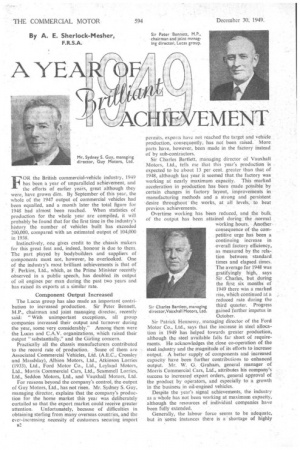
Page 37
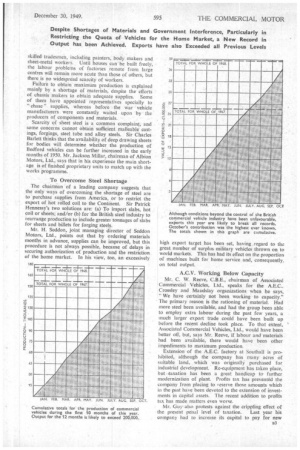
Page 38
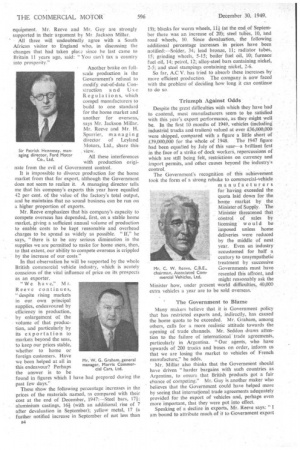
Page 39
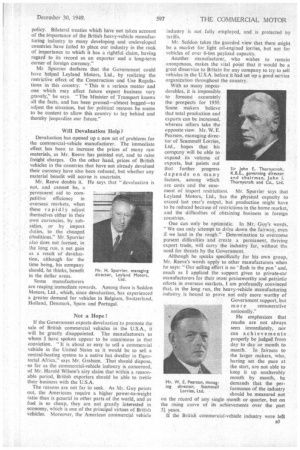
Page 40
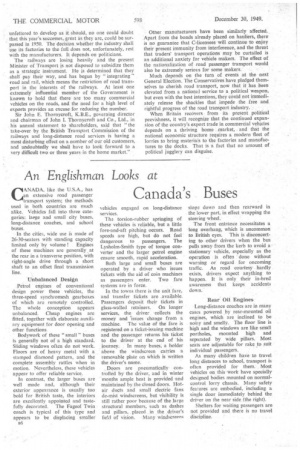
If you've noticed an error in this article please click here to report it so we can fix it.
F.R.S.A.
FOR the British commercial-vehicle industry, 1949 has been a year of unparalleled achievement, and the efforts of earlier years, great although they were, have grown dim. By September of this year, the whole of the 1947 output of commercial vehicles had been equalled, and a month later the total figure for 1948 had almost been reached. When statistics of production for the whole year are compiled, it will probably be found that for the first time in the industry's history the number of vehicles built has exceeded 200,000, compared with an estimated output of 104,000 in 1938.
Instinctively, one gives credit to the chassis makers for this great feat and, indeed, honour is due to them. The part played by bodybuilders and suppliers of components must not, however, be overlooked. One of the industry's most brilliant achievements is that of F. Perkins, Ltd., which, as the Prime Minister recently observed in a public speech, has doubled its output of oil engines per man during the past two years and has raised its exports at a similar rate.
Component Output Increased
The Lucas group has also made an important contribution to increased production. Sir Peter Bennett, M.P., chairman and joint managing director, recently said: "Withunimportant exceptions, all group companies increased their output and turnover during the year, some very considerably." Among them were the Lucas and C.A.V. organizations, which raised their output "substantially," and the Girling concern.
Practically all the chassis manufacturers contributed to the record rate of production. Some of them are Associated Commercial Vehicles, Ltd. (A.E.C., Crossley and Ma udthy), Albion Motors, Ltd., Atkinson Lorries (1933), Ltd.. Ford Motor Co., Ltd., Leyland Motors, Ltd., Morris Commercial Cars, Ltd., Scammell Lorries, Ltd., Seddon Motors, Ltd., and Vauxhall Motors, Ltd.
For reasons beyond the company's control, the output of Guy Motors, Ltd., has not risen. Mr. Sydney S. Guy, managing director, explains that the company's production for the home market this year was deliberately curtailed so that the export market could receive greater attention. Unfortunately, because of difficulties in obtaining sterling from many overseas countries, and the ever-increasing necessity of customers securing import ti2
permits, exports have not reached the target and vehicle production, consequently, has not been raised.More Parts have, however, been made in the factory instead of by sub-contractors.
Sir Charles Bartlett, managing director of Vauxhall Motors, Ltd., tells me that this year's production is expected to be about 13 per cent, greater than that of 1948, although last year it seemed that the factory was working at nearly maximum capacity. This marked acceleration in production has been made possible by certain changes in factory layout, improvements in manufacturing methods and a strong and persistent desire throughout the works, at all levels, to beat previous achievements.
Overtime working has been reduced, and the bulk of the output has been attained during the normal Working hours, • Another• consequence of the competitive urge has been a continuing increase in overall factory efficiency, as measured by the relation between standard times and elapsed times. The average for 1948 was gratifyingly high, . says Sir .Charles, but during the first six months of 1949 there was a marked rise, which continued at a reduced rate during the third quarter. Progress gained further impetus in October.
Sir Patrick Hennessy, managing director of the Ford Motor Co., Ltd., says that the increase in steel allocation in 1949 has helped towards greater production, although the steel available falls far short of requirements. He acknowledges the close co-operation of the steel industry and the magnitude of its efforts to increase output. A better supply of components and increased capacity have been further contributions to enhanced output. Mr. W. G. Graham, general manager of Morris Commercial Cars, Ltd., attributes his company's success to increased export orders, general approval of the product by operators, and especially to a growth in the business in oil-engined vehicles.
Despite the year's signal achievements, the industry as a whole has not been working at maximum capacity, although the resources of individual companies have been fully extended.
Generally, the labour force seems to be adequate, but in some instances there is a shortage of highly
Sir Charles Bartlett, managing director,Vauxhall Motors, Ltd.
skilled tradesmen, including painters, body makers and sheet-metal workers. Until houses can be built freely, the labour problems of factories remote from large centres will remain more acute than those of others, but there is no widespread scarcity of workers.
Failure to obtain maximum production is explained mainly by a shortage of materials, despite the efforts of chassis makers to obtain adequate supplies. Some of them have appointed representatives specially to "chase" supplies, whereas before the war vehicle manufacturers were constantly waited upon by the producers of components and materials.
Scarcity of sheet steel is a common complaint, and some concerns cannot obtain sufficient malleable castings, forgings, steel tube and alloy steels. Sir Charles Barlett thinks that the availability of deep drawing sheets for bodies will determine whether the production of Bedford vehicles can be further increased in the early months of 1950. Mr. Jackson Millar, chairman of Albion Motors, Ltd., says that in his experience the main shortage is of finished proprietary units to match up with the works programme.
VALUE OF EXPORTS-C.000,0005
To Overcome Steel Shortage The chairman of a leading company suggests that the only ways of overcoming the shortage of steel are to purchase supplies from America, or to restrict the export of hot rolled coil to the Continent. Sir Patrick Hennessy's two solutions are: (a) To import slabs, hot coil or sheets; and/or (b) for the British steel industry to rearrange production to include greatet tonnages of slabs for sheets and billets for forging steels.
Mr. H. Seddon, joint managing director of Seddon Motors, Ltd., points out that by ordering materials months in advance, supplies can be improved, but this procedure is not always possible, because of delays in securing authorization of production and the restriction of the home market. In his view, too, an excessively high export target has been set, having regard to the great number of surplus military vehicles thrown on to world markets. This has had its effect on the proportion of machines built for home service and, consequently, on total output.
A.C.V. Working Below Capacity Mr. C. W. Reeve, C.B.E.: chairman of Associated Commercial Vehicles, Ltd., speaks for the A.E.C.. Crossley and Maudslay organizations when he says, "We have certainly not been working to capacity." The primary reason is the rationing of material. Had more steel been available, and had the group been able to employ extra labour during the past few years, a much larger export trade could have been built up before the recent decline took place. To that extent, Associated Commercial Vehicles, Ltd., would have been better off, but, says Mr. Reeve, if labour and materials had been available, there would have been other impediments to maximum production.
Extension of the A.E.C. factory at Southall is prohibited, although the company has many acres of suitable land, which was originally purchased for industrial development. Re-equipment has taken place, but -taxation has been a great handicap tofurther modernization of plant. Profits tax has prevented the company from placing to reserve those amounts which ill the past have been devoted to the extension of investments in capital assets. The recent addition to profits tax has made matters even worse.
Mr. Guy also protests against the crippling effect of
the present penal level of taxation. Last year his company had to increase its capital to pay for new
equipment. Mr. Reeve and Mr. Guy are strongly supported in their argument by Mr. Jackson Millar.
All three will undoubtedly agree with a South African visitor to England who, in discussing the changes that had taken placc since he last came to Britain 11 years ago, said: You can't tax a country into prosperity."
Another brake on fullscale production is the Government's refusal to inodify out-of-date Construction and Use Regulations, which compel manufacturers to build to one standard for the home market and another for overseas, says Mr. Jackson Millar. Mr. Reeve and Mr. H. Spurrier, managing director of Leyland Motors, Ltd., share this
view.
All these interferences with production originate from the evil of Government control.
It is impossible to divorce production for the home market from that for export, although the Government does not seem to realize it. A managing director tells me that his company's exports this year have equalled 42 per cent, of the value of the factory's total output, and he maintains, that no sound business can be run on a higher proportion of exports.
Mr. Reeve emphasizes that his company's capacity to compete overseas has depended, first, on a stable home market, giving a sufficient annual volume of production to enable costs to he kept reasonable and overhead charges to be spread as widely as possible. "If," he says, "there is to be any serious diminution in the supplies we are permitted to make for home users, then, to that extent, our ability to compete overseas is crippled by the increase of our costs."
In that observation he will be supported by the whole British commercial vehicle industry, which is acutely conscious of the vital influence of price on its prospects as an exporter.
"We have," Mr. Reeve continues, "despite rising markets in our own principal supplies, endeavoured by efficiency in production, by enlargement of the volume of that production, and particularly by its exportation to markets beyond the seas, to keep our prices stable, whether to home or foreign customers. Have
we been helped at all in Mr. W. G. Graham, general this endeavour? Perhaps manager, dal Morris CommerCars, Ltd. Sir Patrick Hennessy, managing director, Ford Motor Co., Ltd,
the answer is to be found in figures which 1 have had prepared during the past few days."
These show the following percentage increases in the prices of the materials named, as compared with their cost at the end of December, 1947:—Steel bars, 171: aluminium castings, 16i (with an additional rise of 7 after devaluation in September); yellow metal. 17 (a further notified increase in September of not less than B4 19); blanks for worm wheels, 1 (at the end of September there was an increase of 20); steel tubes, 10, and road Wheels, 10. Since devaluation, the following additional percentage increases in prices have been notified:—Solder, 34; lead bronze, 11; radiator tubes, 15; grinding wheels, 5-15; boiler fuel oil, 10; furnace fuel oil, 14; petrol, 12; alloy-steel bars containing nickel, 2-5; and steel stampings containing nickel, 2-6.
So far, A.0 V. has tried to absorb these increases by more efficient production. The company is now faced with the problem of deciding how long it can continue to do so.
Triumph Against Odds Despite the great difficulties with which they have had to contend, most manufacturers seem to be satisfied with this year's export performance, as they might well be. In the first 10 months of 1949, vehicles (including industrial trucks and trailers) valued at over £36,000,000 were shipped, compared with a figure a little short of £39,000,000 for the whole of 1948. The 1947 figure had been equalled by July of this year—a brilliant feat in the face of a strike of dock workers, repercussions of which are still being felt, restrictions on currency and import permits, and other causes beyond the industry's control.
The Government's recognition of this achievement took the form of a strong rebuke to commercial-vehicle manufacturers for having exceeded the quota laid down for the home market by the Minister of Supply. The Minister threatened that control of sales by licensing would be imposed unless home deliveries were reduced by the middle of next year. Even an industry accustomed for half a century to Unsympathetic treatment by successive Governments must have resented this affront, and might reasonably ask the Minister how, under present world difficulties, 40,000 extra vehicles a year are to be sold overseas.
Mr. C. W. Reeve, C.B.E., chairman, Associated Commercial Vehicles, Ltd.
The Government to Blame Many makers believe that it is Government policy that has restricted exports and, indirectly, has caused the home quota to be exceeded. Mr. Graham, among others, calls for a more realistic attitude towards the opening of trade channels. Mr. Seddon draws attention to the failure of international trade agreements, particularly in Argentina. "Our agents, who have upwards of 200 trucks and buses on order, inform us that we are losing the market to vehicles of French manufacture," he adds.
' Mr. Millar also thinks that the Government should have driven "harder bargains with such countries as Argentina, to ensure that British products got a fair chance of competing." Mr. Guy is another maker who believes that the Government could have helped more by seeing that international trade agreements adequately provided for the export of vehicles and, perhaps even more important, that they were put into effect. Speaking of a decline in exports, Mr. Reeve says: "1 am bound to attribute much of it to Government export policy. Bilateral treaties which have not taken account of the importance of the British heavy-vehicle manufacturing industry to many developing and undeveloped countries have failed to place our industry in the rank of importance to which it has a rightful claim, having regard to its record as an exporter and a long-term earner of foreign currency."
Mr. Spurrier declares that the Government could have helped Leyland Motors, Ltd., by realizing the restrictive effect of the Construction and Use Regulations in this country. "This is a serious matter and one which may affect future export business very gravely," he says. "The Minister of Transport knows all the facts, and has been pressed—almost begged—to adjust the situation, but for political reasons he seems to be content to allow this country to lag behind and thereby jeopardize our future."
Will Devaluation Help ?
Devaluation has opened up a new set of problems for the commercial-vehicle manufacturer. The immediate effect has been to increase the prices of many raw materials, as Mr. Reeve has pointed out, and to raise freight charges. On the other hand, prices of British vehicles in the countries that have not already devalued their currency have also been reduced, but whether any material benefit will accrue is uncertain.
Mr. Reeve doubts it. He says that " devaluation is not, and cannot be, a permanent aid to competitive efficiency in overseas markets, when these rapidly adjust themselves either in their own currencies, by subsidies, or by import duties, to the changed cdnditions." Mr. Spurrier also does not foresee, in the long run, a net gain as a result of devaluation, although for the time being, his company should, he thinks, benefit in the dollar areas.
Some manufacturers are reaping immediate rewards. Among them is Seddon Motors, Ltd., which, since devaluation, has experienced a greater demand for vehicles in Belgium, Switzerland, Holland, Denmark, Spain and Portugal.
Mr. H. Spurrier, managing director, Leyland Motors,
Ltd.
Not a Hope !
If the Government expects devaluation to promote the sale of British commercial vehicles in the U.S.A., it will be greatly disappointed. The manufacturers to whom I have spoken appear to be unanimous in that conviction. " It is about as easy to sell a commercial vehicle in the United States as it would be to sell a central-heating system to a native hut dweller in Equatorial Africa," says Mr. Graham. That should dispose, so far as the commercial-vehicle industry is concerned, of Mr. Harold Wilson's airy claim that within a reasonable period, British exporters should be able to treble their business with the U.S.A.
The reasons are not far to seek. As Mr. Guy points out, the Americans require a higher power-to-weight ratio than is general in other parts of the world, and as fuel is so cheap, they are not greatly interested in economy, which is one of the principal virtues of British vehicles. Moreover, the American commercial vehicle industry is not fully employed, and is protected by tariffs.
Mr. Seddon takes the guarded view that there might be a market for light oil-engined lorries, but not for vehicles of over 6-ton payload capacity.
Another manufacturer, who wishes to remain anonymous, makes the vital point that it would be a great disservice to Britain for any company to try to sell vehicles in the U.S.A. before it had set up a good service organization throughout the country.
With so many imponderables, it is impossible to forecast accurately the prospects for 1950. Some makers believe that total production and exports can be increased, whereas others take the opposite view. Mr. W. E. Pearson, managing director of Scammell Lorries, Ltd., hopes that his company will be able to expand its volume of exports, but points out that further progress depends on many factors, among which are costs and the ease
ment of import restrictions. Mr. Spurrier says that Leyland Motors, Ltd., has the physical capacity to exceedlast year's output, but production might have to be reduced because of restrictions in the home market,. and the difficulties of obtaining business in foreign countries.
One can only be optimistic. In Mr. Guy's words, "We can only attempt to driye down the fairway, even if we land in the rough." Determination to overcome present difficulties and create a permanent, thriving export trade, will carry the industry far, without the need for threats by the Government.
Although he speaks specifically for his own group, Mr. Reeve's words apply to other manufacturers when he says: " Our selling effort is no 'flash in the pan' and, much as I applaud the support given to private-car manufacturers for their most praiseworthy and patriotic efforts in overseas markets, I am profoundly convinced that, in the long run, the heavy-vehicle manufacturing industry is bound to prove not only more worthy of
Sir John E. Thornycroft, K.B.E., governing director and chairman, John I. Thornycroft and Co., Ltd.
Government support, but
m 0 r e remunerative nationally."
He emphasizes that
results are not always seen immediately, nor can achievements properly be judged from day to day or month to month. In fairness to the larger makers, who, having set the pace at the start, are not able to keep it up unalterably month by month, he demands that the performance of the industry should be measured not
on the record of any single month or quarter, but on the rising curve of its achievements over the past 3 years.
If the British commercial-vehicle industry were left
unfettered to develop as it should, no one could doubt that this year's successes, great as they are, could be surpassed in 1950. The decision whether the industry shall use its factories to the full does not, unfortunately, rest with the manufacturers. It depends on politicians.
The railways are losing heavily and the present Minister of Transport is not disposed to subsidize them as a strategic instrument, He is determined that they .shall pay their way, and has begun by " integrating " road and rail, which means the restriction of road transport in the interests of the railways. At least one extremely influential member of the Government is known to hold that there are too many commercial vehicles on the roads, and the need for a high level of exports provides an excuse for reducing the number.
Sir John E. Thornycroft, K.B.E., governing director and chairman of John I. Thornycroft and Co., Ltd., in his annual statement to shareholders, said that "the take-over by the British Transport Commission of the railways and long-distance road services is having a most disturbing effect on a number of our old customers, and undoubtedly we shall have to look forward to a very difficult two or three years in the home market."
Other manutacturers have been similarly affected. Apart from the bonds already placed on hauliers, there is no guarantee that C-licensees will continue to enjoy their present immunity from interference, and the threat that traders' transport operations may be curtailed is an additional anxiety for vehicle makers. The effect of the nationalization of road passenger transport would also be extremely serious for some makers.
Much depends on the turn of events at the next General Election. The Conservatives have pledged themselves to cherish road transport, now that it has been elevated from a national service to a political weapon, but even with the best intentions, they could not immediately release the shackles that impede the free and rightful progress of the road transport industry. When Britain recovers from its present political peevishness, it will recognize that the continued expansion of the country's export trade in commercial vehicles depends on a thriving home market, and that the national economic structure requires a modern fleet of lorries to bring materia[s to the factories and manufactures to the docks. That is a fact that no amount of political jugglery can disguise.




















































































